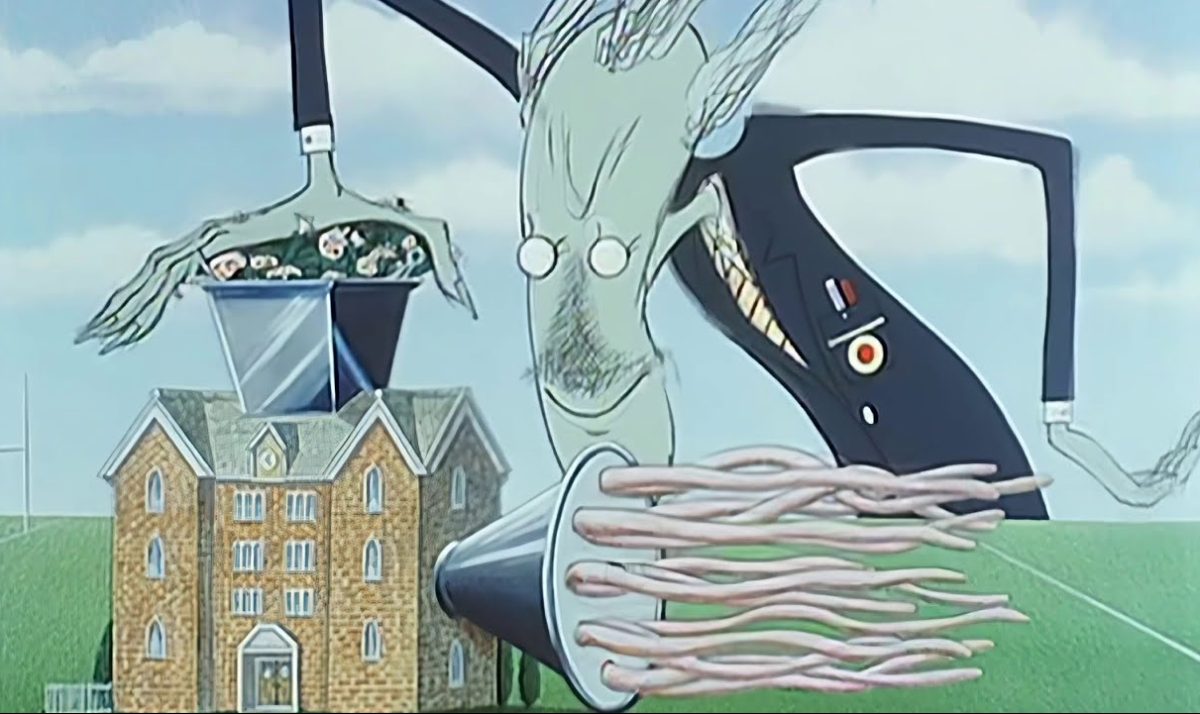Droplets of rain cascade down the school bus window – a dark cumulonimbus cloud hanging low at the cusp of the overcast skies. Your back hurts from lugging around your heavy backpack all day, but the pain seems to ache past your bones, sinking into the deepest parts of your soul. The work has been piling up recently, and it doesn’t help that you can’t seem to go one minute without the world screaming into your ear, “what do you want to do with your life!?” You don’t understand. You have straight A’s in all your classes, you’ve gotten a good score on the SAT, you’ve gotten into a prestigious college that is sure to bring you success. You’ve checked all of the boxes on the list of things necessary for a “successful future.” So why – do you still feel so hopeless?
Chances are, you’ve simply fallen victim to the inevitable byproduct of a system such as this – where teenagers are urged to run as fast as they can without ever getting the chance to stop and think, what is it that I’m running towards? In a world that prioritizes this superficial notion of success, what happens to those who are unable to fit within the mold? What happens to the students whose minds refuse to twist and contort to fit the redundant and arbitrary nature of the institution. When did school become about cramming and regurgitating knowledge, rather than fostering and facilitating growth unique to the individual?
Let’s start at the beginning. The roots of the school system date back to the Industrial Revolution – an up-and-coming American economy in desperate need of subservient workers. Schools were created to cultivate disciplined, punctual, and obedient workers for factories – the model of education emphasizing standardized routines, fixed schedules, and maximum efficiency. While this approach was certainly efficient for training large numbers of compliant laborers, it left little room for individual creativity or divergent minds who yearned for something more. This system also enforced a strict hierarchy; where teachers acted as supervisors, and students were expected to perform to a standard without questioning authority. In an institution such as this, it’s no wonder why the ignorant thrived and the intellectuals suffered.
This emphasizes the core of the issue; that our school systems treat students as a monolith, rather than multi-faceted individuals with unique skills and dreams. It boils us down to our purest form, arms and legs made for cranking out products, not minds made for thinking and creating. It’s like taking a vast assembly of shapes and expecting them all to fit into a circular hole, and when they don’t fit, rather than creating new molds, they warp and distort until they’re able to be pushed through. Or, as rock band Pink Floyd rather grotesquely depicted it through their music video for “Another Brick in the Wall,”; like shoving hordes of bodies into a meat grinder, churning out unrecognizable chunks of raw ground meat.
As a young kid, I had always loved reading and writing. The ability to escape into the deepest parts of my own imagination was one that I now, in retrospect, realized I’d taken for granted. Climbing upon the backs of classic stories and fantastical series was something that gave me, and millions of other children, respite for much of our young lives. As I grew older, I managed to find my own voice – allowing it to flow through words and onto the pages of various loose-leaf papers that lined my messy notebooks. It was cathartic – to have an outlet to tell the stories that gnawed at the back of my mind like pleading, eager voices begging to be heard.
Then, something shifted. More simply put – I began high school.
Up until then, school had almost been a non-factor in my life. It was something I did, but I rarely allowed it to consume much of my time or thoughts. But this year, things were different. Now, I was being told that the way I was writing was wrong – that it had to fit into the strict parameters of MLA format and 3-act structure. I was told that I was reading the wrong way, and despite literature being “open for interpretation,” the only interpretation that was truly valid was the one the teacher and curriculum stated. I was placed in a math class that I couldn’t, for the life of me, understand why I had to take. I had completed algebra the prior year, and I had already decided that whatever career path I pursued – math would absolutely not be a part of it. And yet, I found myself caught up on geometry homework deep into the late hours of the night, submitting half-completed, tear-stained papers of problems I just simply could not get my mind to comprehend.
Before I knew it, I found all of my time consumed by busy work that I would shove down my throat and spit out onto the page – never to be thought of again once I pressed “submit.” I wasn’t against learning new things by any means, but the nature of the classes seemed antithetical to the act of learning itself.
When I asked my mom why I had to take all of these worthless, time-consuming classes, she said it was so I could pass the grade. When I asked her why I needed to pass the grade, she said it was so I could graduate. When I asked her why I needed to graduate, she said it was so I could get into college. When I asked her why I needed to get into college, she said it was so I could get a good job. When I asked her why I needed to get a good job, she said it was so I could be successful in society.
And that was when the revelation occurred.
School was not about learning – it never was. It was about completing all of the necessary steps, in the necessary way, so you could live out the necessary future in order to achieve success and stability. I was foolish for believing that school had ever once cared about fostering my individual skills and talent, or hearing out my individual voice, because all it boiled down to was molding me into a civil servant of society. I was nothing more than grades on a transcript, numbers on a scale – wrapped up neatly into an application.
Halfway through my Junior year, I had reached a level of burnout beyond what I had ever experienced. My work was piling on in the second semester, and I once again had a lineup of classes in which I derived little to no enjoyment. Each day was misery, and I found myself spiraling into a deeper, darker, depression within the depression I had already been in the past 2 years. School had taken over my life, and I felt suffocated within the life I was being told to live. Despite having all A’s and B’s, I felt hopeless about my future, unable to imagine what it would even be like living the next five years.
When I went to talk to the counselors, the only concern they addressed was my dropping grade in Pre-Calc. When I confided in my parents, all they could tell me was “push through, you’re almost done.” But that only prompted further questions in my mind – what was beyond high school? College? Insurmountable debt wrapped up into a fancy name to put on my resume? Working full-time at Walmart? Suppressing all of my wandering thoughts to the back of my mind as I grind through 9 hour shifts, 5 days a week? No matter what option I mulled over in my mind, I couldn’t escape the inevitable dread of taxes and despair. I’d seen what the 9-5 grind had done to my parents and coworkers, and I couldn’t understand how anyone could live like that.
I knew that my teachers and counselors were trying to help and offer as much support as possible, but the truth was that I was unable to be happy because of the system they were actively perpetuating – be it consciously or not. I’ve always had a deep desire to create, and that desire was slowly sucked out of me over the course of my high school career, draining me of all life and purpose in the process. It angered me to no end that I had to waste my time studying quadratic formulas and memorizing useless facts when I could be spending it enriching my abilities to their greatest potential. If I spent those 7 hours each day, 5 days a week, working on projects that brought me genuine joy and exaltation, I have no doubt I would be a published artist or author by now – mind rich with ideas bursting to be set to paper.
But instead, I was a jaded, depressed, teen who could barely manage to get out of bed each morning and yearned for my mattress each night, hoping that my dreams would bring me the escape I so craved.
Unfortunately, my experience is not unique. 42% of high school students have reported feelings of sadness or hopelessness in the last year, and while these can be caused by a variety of factors, academic pressure is one of the leading causes. An estimated 20% of teens will experience depression by age 17, and 15.1% will suffer a major depressive episode. Naturally, when left lingering and untreated, depression results in suicide – the second-leading cause of death for teens and young adults. A study by the CDC revealed that 22% of high school students have seriously considered suicide in the past year, and 10% have attempted. Schools have attempted to combat the rising statistics by providing programs of support, but my own experience and many others have proved that they just aren’t enough in combating the issue. In order to truly address the matter at hand, schools must be willing to look inward and question whether they are part of the problem.
So, what can we do? I’ve just shared some pretty hopeless sentiments and statistics, so it’s only natural to ask – how can things change from here? Obviously, I do not have the power to wave my hand and reform a centuries-long organization, but there are little things that can be done to make school more bearable for a large portion of the young population. For one; allow for more diversity in classes. Having classes that stimulate or invoke some passion helps a ton in surviving the daily grind. Of course – there’s still the mandatory math class that makes me want to rip out all of my hair and scream into the void – but having classes that you find genuinely intriguing is critical in building a sustainable learning environment.
Second of all; there should be less of an emphasis on grades. At this point, classes feel like placeholders in a competition for getting the best possible scores and rankings, like a competitive gauntlet rather than a measure of the brightest minds. For example, someone could be really good at memorizing and studying, thus earning good scores on the standardized tests, but could have limited ideas to bring to the table, a natural consequence of someone who has tucked their mind away to please the system. Whereas, a kid failing all of their classes could have the cure for cancer or the next great American novel hidden somewhere in their mind, but will never be able to access it due to the austere and immutable nature of the grading system. Often, those who think differently than the status quo are othered or alienated, told that their thoughts are too extreme or patronized by authority. We need to embrace – not push away – divergent minds and thinkers because they are the ones with the ideas that can revolutionize our world.
All in all, the rising rates of burnout and depression in youth is not an issue of mere overworking (though that plays a role), but is emblematic of something deeper within the system. This hopelessness is something that sprouts in the back of almost every student’s mind, shoved deep into the dark soils of their mind by layers of infertile soil and horse manure, hoping to snuff out the fermenting rot. But for some, it only continues to grow, festering like a ravenous vine that intertwines itself into every facet of their mind. It’s not something that can simply be cut off – it must be pulled at the source.
This is simply a convoluted way of saying that simply fixing one’s grades will not address the true issue at hand. The refusal to accept the foundation of the decay is why so many schools fall short in relieving struggling students of their burdens. Until institutions are willing to place the needs of the individual over the demands of society, we will continue to see a rise in teens suffering from mental health disorders, and until the school system is reformed in a way that genuinely cares for fostering young minds rather than molding them, teens will only continue to be miserable.
Disclaimer: Articles designated as “Editorial” represent the views and opinions of the author, not the 2023-2024 Periscope staff, CHS/CASD administration, or the CHS student body.






























































































